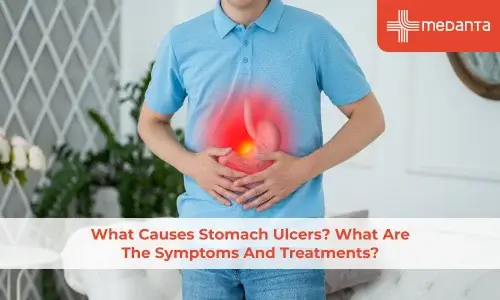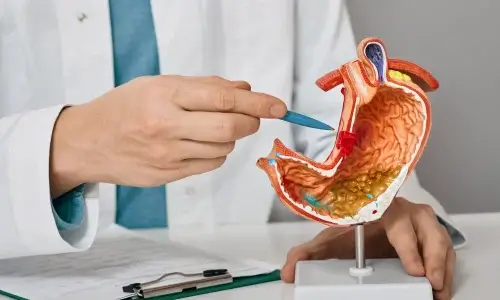What Causes Stomach Ulcers? What Are The Symptoms And Treatments?

TABLE OF CONTENTS
What is a peptic ulcer?
When the gastric acid in your stomach starts eating away the inner most protective lining of the stomach called the mucosa, an ulcer is formed that is difficult to heal on its own. These ulcers are divided into two types based on where they are found:
Gastric ulcer - occurring inside the stomach
Duodenal ulcer - occurring in the starting part of your small intestine
What causes peptic ulcers?
Infection by a bacterium called Helicobacter pylori
Painkillers such as Aspirin or NSAIDs like Ibuprofen, Naproxen Sodium
Steroids, anticoagulants, low-dose aspirin, and anti-depressive SSRI medication when taken with NSAIDs make this risk worse
Smoking
Alcohol consumption
Untreated stress or anxiety
Spicy food
A condition called Zollinger-Ellison Syndrome
Is peptic ulcer dangerous?
Peptic Ulcers can complicate if left untreated and cause-
Bleeding: Peptic ulcers when left alone can cause bleeding from the inside of your stomach. This usually presents as black or blood-colored vomit or stools. As blood gets drained away from your body slowly, symptoms of anemia start coming up.
Untreated peptic ulcers can also lead to a small hole being formed in the stomach lining called a perforation. This is an especially dangerous condition and can cause serious complications.
They can cause restriction of movement of food and cause you to feel full after a small meal, or feel like vomiting sooner.
People with H.Pylori infection are shown to have an increased risk of developing stomach cancer.

What are the signs and symptoms of peptic ulcers?
Burning sensation in the stomach
Bloated feeling in the abdomen
Feeling full after a small meal
Difficulty in consuming fatty food
Heartburn
Vomiting sensation(nausea) and vomiting
The most characteristic sign is stomach pain that increases during an empty stomach and is relieved with foods that help buffer stomach acid.
More serious symptoms in some cases include:
Vomiting with blood
Dark blood-stained stools
Trouble breathing
Unexplained weight loss
Appetite changes
How is gastritis different from peptic ulcer?
Gastritis and stomach ulcers have similar symptoms. Gastritis may precede ulcers and both have similar causative factors. In ulcers, sometimes that pain can be identified as coming from a spot, whereas in gastritis, the pain is more generalized.
What is heartburn?
Heartburn is a slightly different condition caused by the regurgitation of acidic contents of your stomach into the lower parts of your food pipe - the esophagus. However, gastric reflux or heartburn can be a symptom of a stomach ulcer.
What tests are done to identify peptic ulcers?
Endoscopy - A scope for the upper part of the GI tract that helps the doctor see the affected parts and even take samples for further examination
Upper GI imaging - is usually done with an X-Ray after you are asked to swallow a special dye called Barium that helps doctors see the digestive tract better in XRay
CT scan - May be needed to study your organs in more detail. Here also, you may be asked to swallow a dye to help in better imaging
Tests to detect Helicobacter pylori
Blood test
Stool test
Breath test
How can stomach ulcers be managed or treated?
Although common, since a stomach ulcer leads to serious complications in some cases, it is always recommended to visit a doctor. Ulcers can generally heal by themselves if they are given a rest from the factors that caused them. Hence one of the measures is to reduce and discontinue food or other habits that can contribute to your ulcer.
Balance overly acidic food (milk, curd, meat, grain) with alkaline food (fruits, vegetables)
Prevent spicy food that irritates the stomach
Avoid alcohol, caffeine and smoking
Doctors use a combination of methods according to your specific situation to help aid this recovery. The right combination by your doctor should help you feel better in 2-3 weeks:
Antibiotics - to help in the killing of H.pylori bacterium in your stomach
Medicines that reduce acid production in your stomach:
PPIs
H2 Blockers
Antacids
Medicines that help to protect the stomach lining:
Bismuth subsalicylate
Some ulcers that have developed complications like malignancy, bleeding and perforation may need to be surgically corrected.






